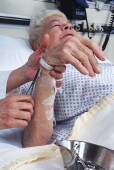
THURSDAY, Jan. 17 (HealthDay News) — The nasty flu season in the United States this year poses a particular risk for people aged 65 and older, an expert warns.
People’s immune systems weaken as they age, explained Dr. Andrew Duxbury, an associate professor in the gerontology, geriatrics and palliative care division at the University of Alabama at Birmingham School of Medicine.
“When older people get the flu and get knocked down further, they are more likely to get other infections, such as pneumonia,” Duxbury said in a university news release. “Just being knocked into bed for as little as three or four days can, in a very frail older person, make it so they lose the ability to walk and do for themselves. It can cause a spiral in disabilities and increase chances of falls and injuries.”
Prevention is the best defense. Seniors and their caregivers should get a flu shot, wash hands regularly and avoid crowds, Duxbury recommended.
He also offered advice about what seniors should do if they get the flu.
“Pay more attention to things like staying hydrated,” Duxbury said. “Appetite and thirst mechanisms are different for older people; they can tip over to dehydration in less than a day if they don’t keep fluids up.”
Seniors with the flu also need to get out of bed at least a little bit, he said.
“It’s better for lungs and helps avoid pneumonia,” Duxbury explained.
He said seniors or their caregivers should call a doctor if they have shortness of breath, a cough that produces mucus or a fever higher than 101 degrees.
More information
Flu.gov has more about seniors and the flu.

